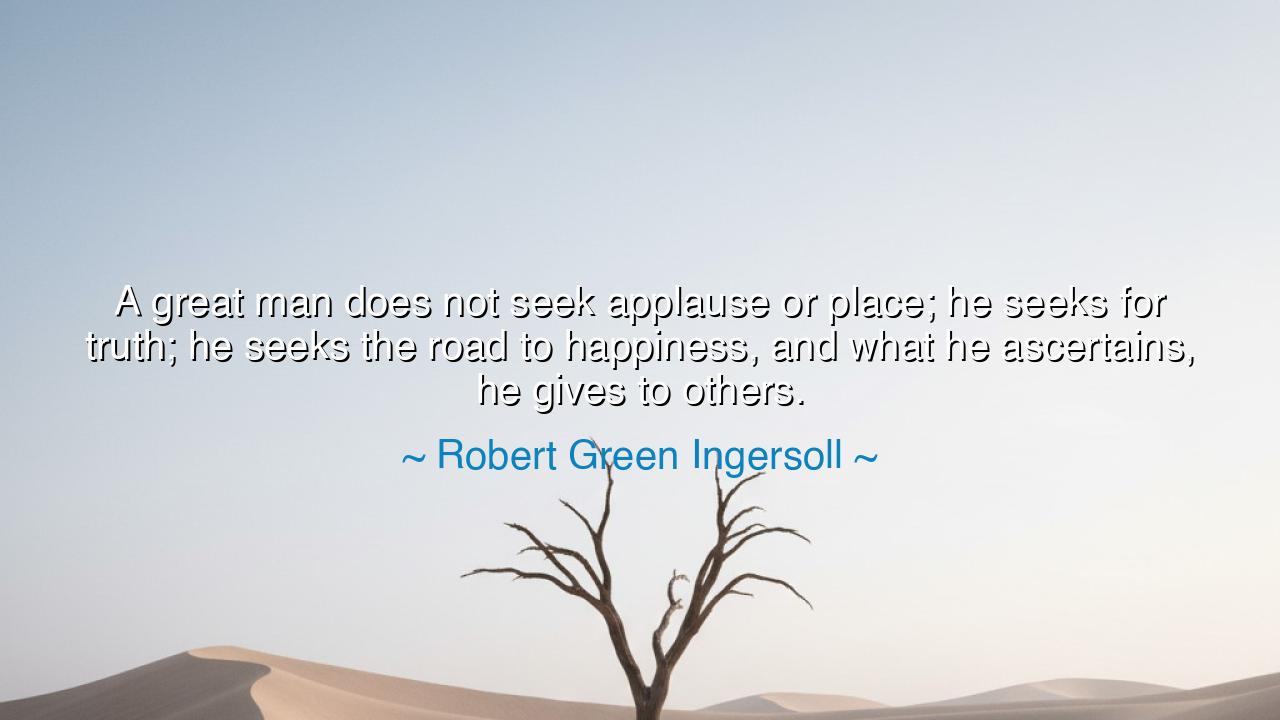
A great man does not seek applause or place; he seeks for truth;
A great man does not seek applause or place; he seeks for truth; he seeks the road to happiness, and what he ascertains, he gives to others.






The great orator and freethinker Robert Green Ingersoll once said: “A great man does not seek applause or place; he seeks for truth; he seeks the road to happiness, and what he ascertains, he gives to others.” In this simple but profound utterance, Ingersoll revealed the essence of true greatness—that it lies not in ambition or acclaim, but in the pursuit of truth and the willingness to share that truth for the good of all. His words stand as a rebuke to vanity and a hymn to selfless wisdom. They remind us that the measure of a soul is not how loudly the world praises it, but how quietly it serves the eternal principles of honesty, goodness, and enlightenment.
Ingersoll lived in an age of fierce division—post–Civil War America, when religion, politics, and philosophy clashed for dominance. Known as “The Great Agnostic,” he defied convention, defending reason, compassion, and freedom of thought in a time when such ideas invited hostility. It is from that crucible of courage that his quote arises. When he said that a great man “does not seek applause or place,” he was speaking from his own life’s example. He was adored by some, hated by others, but he sought neither flattery nor comfort. His mission was higher—to seek truth, to understand life’s mysteries without prejudice, and to give that understanding to others, as a gift rather than a weapon.
The first lesson within this quote is that truth and greatness are inseparable. The man or woman who seeks applause will find only fleeting shadows of happiness, for the world’s praise is fickle and hollow. But the one who seeks truth—who is humble enough to learn, strong enough to endure criticism, and generous enough to share what is discovered—stands among the truly noble. Ingersoll understood that the road to truth is not smooth; it is strewn with doubt, loneliness, and sacrifice. Yet he teaches that this is the only road that leads to happiness, because truth liberates the soul from illusion, while applause enslaves it.
Consider the example of Galileo Galilei, who stood before the might of the Church to defend his discovery that the Earth moved around the sun. He did not seek applause; indeed, his truth brought him condemnation. Yet centuries later, his courage became the foundation of modern science and reason. Galileo’s happiness was not the laughter of the crowd—it was the inner peace of knowing that he had served truth, even at the cost of comfort. So too with every great spirit in history—Socrates, who drank the hemlock rather than betray philosophy; Abraham Lincoln, who sought justice, not popularity; and countless others whose legacies prove that the pursuit of truth is the noblest form of leadership.
Ingersoll’s quote also reflects a deeper spiritual wisdom: that the highest joy comes not from possessing truth, but from giving it. Knowledge kept to oneself is like a lamp hidden under a basket—it gives no light to others. But when one shares what one has learned—whether it be wisdom, kindness, or simple understanding—one participates in the divine act of creation. This is why Ingersoll said that the great man “gives to others” what he ascertains. True greatness is not accumulation, but illumination. It is the act of turning one’s own enlightenment into a beacon for humanity.
There is a profound humility in this teaching. The great man is not arrogant, for he knows how little he knows. He does not crave “place,” for he understands that the universe is vast and his life but a spark within it. Yet this humility is what grants him strength. Freed from vanity, he can dedicate himself wholly to the service of truth. Freed from ambition, he can love others without calculation. The great man does not command followers—he inspires them. He does not lead with authority, but with example.
So, my children of wisdom, remember this: seek not applause, but understanding; seek not rank, but righteousness. Let your life be guided not by the noise of the crowd, but by the quiet voice of truth within your heart. Be courageous enough to learn, generous enough to teach, and humble enough to serve. For in doing so, you will walk the same path as the sages and heroes before you. As Ingersoll teaches, greatness is not a throne, but a torch—and it is your duty to carry that torch through the darkness, so that others may find the light.
And when your own journey nears its end, you will find that happiness has never been distant. It has lived all along in the simple, noble acts of honesty, kindness, and courage. This is the eternal legacy of the great: to live not for applause, but for truth—and to leave behind a world brighter than the one they found.






AAdministratorAdministrator
Welcome, honored guests. Please leave a comment, we will respond soon